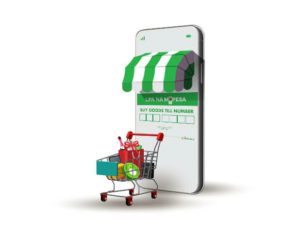Telecommunications giant; Safaricom has launched a brand new zero interest loan service which will make it possible for its customers to shop for goods with a credit line of not more than 100,000 Kenyan Shillings.

With the new loan service which observers believe could positively shake up the mobile loans sector in Kenya, users will be able to pay back at later dates.
The interest free credit by Safaricom which is called ‘Faraja’, will allow users pay for services and goods from as low as 20 Kenyan Shillings to a maximum amount of not more than 100,000 Kenyan Shillings. Unlike other loan services, users will not be charged any additional fees when repaying their loans.
The usual M-Pesa transaction charges will however be deducted whenever goods and services are being paid for.
Although Faraja is to a certain extent similar to the Lipa Later service already in use today, its advantage for users is that they will be get goods and services from select options of merchants where they (the users) will not be charged any upfront costs in installments.
Read Also: Kenya Secures New Fuel Deal With Saudi Arabia
Faraja is funded by Equity Bank Kenya which is the largest bank subsidiary of Equity Group Holdings Plc, and one of East Africa’s leading banks.
The new loan product will work just like a digital credit card and users will be provided with individual credit limits of up to 100,000 Kenyan Shillings to be used for their payments of services and goods. The ability of a Faraja user to get to that loan limit, will be dependent on said user’s individual credit score.
Users of Faraja will be given 30 days to repay the loans they receive.
Safaricom made it known via a statement on its official website that, “You will only be required to repay the outstanding facility amount as advanced to you by us (in whole or in part) using the designated Paybill number or such other channels as provided by us from time to time.”

The new product could just be what the mobile loans sector in Kenya needs to spur up more competition as it has the potential to take up market share from other products like M-Shwari, KCB-Mpesa, Fuliza, and from digital or online loan providers like Zenka, Tala, and Branch.
Both Safaricom and Equity Bank aim to generate interview from the increase in the number of M-Pesa transactions at a number of the stores in the country. According to reports, a number of outlets like Goodlife Pharmacy, Citi Walk which is a store selling shoes and Naivas Supermarket, have already signed up to be merchants.
In June of 2013 telecommunications giant; Safaricom, launched Lipa na M-Pesa. The product has since grown to a mainstay choice for merchants, small businesses and large businesses alike all over the country. These includes Supermarkets, Eateries, Fuel Stations and convenience stores.
Its exponential growth has resulted in the service taking away substantial market share from card payment services offered by banks in the country and the global technology powerhouses they partner with like MasterCard and Visa. This is due to the fact that said card payment services placed a predominant focus on formal retailers.
Read Also: Proparco Seals 3.71 Billion Kenyan Shilling Stake In Naivas Supermarket
Faraja is also owned by Edomx Ltd which is a company focused on financial technology. It is believed that all parties involved will be using a revenue sharing system.
Telecommunications company; Safaricom’s Paybill service and Till service have both become dominant forces in the market. As at the time of putting this article together both services control a combined 85.8 percent market share in the non-cash payments side for services and goods. This is more proof of how well Safaricom’s mobile money service; M-Pesa, has become integral to everyday transactions in Kenya.
In the year leading up to March of 2022, a total of 1.4 trillion Kenyan Shillings was transacted via Safaricom’s Lipa na M-Pesa service.
For the telecommunications company’s mobile money service; M-Pesa, a total of 9.78 trillion Kenyan Shillings was transacted via the platform providing further proof of just how popular the mobile money service is and how more and more users prefers to carrying physical money around.

Safaricom revealed via its official website that for transactions ranging from 50,000 Kenyan Shillings to 150,000 Kenyan Shillings business owners are charged not more than 210 Kenyan Shillings for all transactions carried out via till.
Observers believe that the major competition for the new loan service; Faraja, will come from micro lending platforms backed by banks.
Safaricom currently controls a majority of the market share in the mobile loans sector where it is possible for users to get loans in a matter of minutes through the mobile devices, helping said users to sort out their bills and other emergency bills quickly.
Since its launch on M-Pesa in 2012, M-Shwari has risen to become a major revenue generator for NCBA and Safaricom. Users of M-Shwari pay a facility fee of 7.5 percent for all M-Shwari loans resulting in a total interest rate of ninety (90) percent when annualized.
Read Also: How To Pay An M-Shwari Loan For Another Safaricom Number
For KCB M-Pesa which was launched in March of 2015, users pay a fee of 8.64 percent.
Safaricom’s Fuliza service which is an overdraft product that was launched on the 5th of January 2019. The product is a partnership between Safaricom, KCB Group, and the Commercial Bank of Africa which has now been merged into NCBA.
With Fuliza users pay a daily fee of 1.083 percent or a total of 395.2 percent per year, signifying the high cost of using short term loan services on a regular basis.
Faraja will mark the second time Equity Bank and Safaricom will begin a partnership after their other platform; M-Kesho.

2019 was the first time Equity Bank set up a joint plan with telecommunications company; Safaricom, for the creation of a new mobile banking product.
The Chief Executive Officer (CEO) of Equity Group; James Mwangi made it known that both companies; Equity and Safaricom will, “work together to identify and deepen financial opportunities for Kenyans.”
As at December of 2021 Equity Bank had a total of 36,133 Point Of Sale (POS) locations.
Read Also: How To Turn Your Photos To Stickers On WhatsApp
According to the Chief Executive Officer (CEO) both companies will make use of the lessons they learnt from the first product; M-Kesho which was unsuccessful. In his words, “We were supply-driven back then but now we will be demand-driven.”
He added that, “We have learnt our lessons. We were young then now we are bigger and better.”
How informative was this particular article? Are there any other news topics, categories, or How To topics, that you would like us to write on? Feel free to reach out to Nexbit KE in the comment section.


